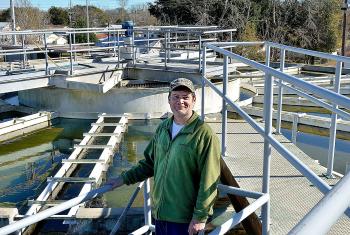
West Virginia spill shows vulnerability of water supply
In the event of a chemical spill similar to the one last week in West Virginia, area and state officials say they have emergency plans in place and that the water supply is rigorously checked for contaminants on a daily basis.
The Morgan City Water Treatment Plant has a hydrocarbon monitor that automatically sets off an alarm if oils, diesel, gas and anything else carbon are present in the water, Morgan City Water Treatment Plant Chief Operator John Fromenthal said. If contaminants are discovered in the water, the water system will either be shut off until the contaminants are removed from the water or switch water sources, Fromenthal said.
If a chemical spill did occur north on the Mississippi River, the Coast Guard would notify the water plant well ahead of time, Fromenthal said. However, the U.S. Coast Guard would probably be able to close the locks to prevent those waters from getting to Morgan City, he said.
The Intracoastal Waterway is Morgan City’s primary water source, and the Atchafalaya River is the backup water source if needed, Fromenthal said.
Morgan City also has a tie-in with the Amelia Water Treatment Plant to use each other as backup water sources, Fromenthal said. Amelia’s primary water source is Bayou Boeuf.
Berwick, Bayou Vista and Patterson get their water from Bayou Teche.
Patterson Public Works Director Steve Bierhorst said the state requires every water plant to have a contingency plan. Though Patterson’s primary water source is Bayou Teche, Patterson can use Centerville or Bayou Vista’s water system as a backup source and vice versa, Bierhorst said. “That’s pretty much basically our contingency for a chemical type spill.”
Patterson is preparing to build a new water treatment plant, and Bierhorst hopes to have everything finalized to be able to go to bid on the project by the end of 2014, he said.
Duval Arthur, St. Mary Parish Office of Homeland Security and Emergency Preparedness executive director, said all water systems in the parish have plans in place to address any water contamination issue. “I have in place a truckload of water, individual bottled drinking water just in case of an emergency like that,” Arthur said.
St. Mary Parish has protection from offshore oil entering the water supply from the Atchafalaya River, the Calumet Cut and Charenton Navigation Canal. Those three tributaries push “bad water” away, Arthur said.
“In other words, if there’s something like oil in the water, it can’t come up the Atchafalaya River. It can come up the Calumet Cut. It can’t come up the Charenton Navigation Canal,” Arthur said. “A lot of our drinking water comes out of those three tributaries.”
Morgan City’s water filtering system takes the raw water from Intracoastal Waterway on La. 70 by Lake Palourde and filters out the mud and other impurities, Fromenthal said. The water is then treated with chlorine and ammonia, which kills any other leftover bacteria, he said.
“This is one of the things that people never think about is their water because it’s there when they open a faucet. But they don’t know how delicate of a process it is to get it to them clean and safe,” Fromenthal said. The plant has to follow many regulations from multiple state and federal agencies to ensure the water is safe to use, he said.
The water treatment plant is regulated by the Environmental Protection Agency, the Louisiana Department of Environmental Quality, Louisiana Department of Health and Hospitals and U.S. Geological Survey.
The EPA is the main regulating body that sets rules for water testing and treatment, Fromenthal said.
One of the only times recently that Fromenthal remembers Morgan City having to use bottled water only was when there was saltwater intrusion into the water system. “Technically, it was still safe to drink, but it was salty. And you don’t want to drink salty water,” Fromenthal said.
The hydrocarbon monitors will detect any hydrocarbons “well before you can smell it or even taste it,” Fromenthal said. Water treatment plant workers have to run lots of different daily tests on the water, in addition to test the state does on the water, Fromenthal said
After 9/11 the U.S. Department of Homeland Security started requiring additional restrictions on water treatment plants to report anyone who was in any way suspected of tampering with the water system, Fromenthal said.
Greg Langley, Louisiana Department of Environmental Quality press secretary, said in an email that the department immediately responds to an incident and is prepared to evaluate the situation and sample if necessary. The department develops a response plan based on the circumstances of the incident, determining the waste or substance involved, and the extent of the event followed by cleanup and waste removal protocols through the Incident Command structure.
Langley also said the department’s plan includes having its staff work with federal, state and local partners to respond to any and all releases into the environment.
- Log in to post comments
